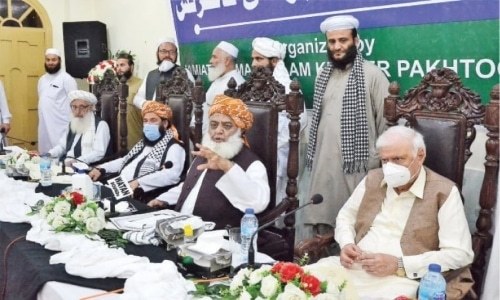The federal government will seek to improve the mechanism for funds distribution under the National Finance Commission (NFC) Award in order to hold the provinces accountable for how they spend the money, Information Minister Shibli Faraz announced on Tuesday.
Addressing a post-cabinet meeting press conference in Islamabad, Faraz said the cabinet discussed the merits and demerits of the current NFC Award mechanism, under which funds are provided to provinces according to their population size.
It emerged during the discussion, and following a presentation given by the finance ministry, that "there is a fundamental gap between the money that the Centre gives to the provinces and the revenues generated by the provinces due to which provincial governments don't have any incentive to increase their revenues," he said.
He said provincial governments "don't have any motivation" to work to raise their revenues locally because "they know they will receive a certain amount" from the federal government. Quoting figures, he said provinces tended to raise funds locally that were less than half of the amount given to them under the NFC Award.
Analyse: NFC: Restoring the fiscal balance
The minister also noted that there was no mechanism to decide how the NFC funds would be spent and the money was seen to have been previously used to pay provincial salaries and for personal use such as purchasing cars, etc.
He said some issues had emerged following the 18th Constitutional Amendment "that are important to be resolved" and that provinces needed to be held accountable for their spending of the NFC funds.
In an apparent reference to Sindh, he said it wasn't visible where the billions of rupees given to "a certain province" were spent.
The minister said besides the NFC award, the federal government also had to spend its funds after natural disasters, during periods like the Covid-19 pandemic, and on development packages. As a result, he said, the Centre "isn't left with a lot and is forced to take loans for its expenses".
Therefore, the cabinet decided that "we will have to improve this mechanism if we want the money to be spent in the right places and on right people," he told the presser.
Faraz later denied the impression that the government sought the repeal of the 18th Amendment, instead saying that there was a need to "improve" the areas that needed correction a decade after the amendment.
According to Faraz, one of the suggestions given during the meeting to improve the system was to "link" the amount given to the provinces under the award to the funds raised by the provinces on their own. "Of course, some provinces will be at an advantage [under this proposal], while some will be at a disadvantage like Khyber Pakhtunkhwa and Balochistan where there is poverty and no industry," he said.
Govt to seek SC guidance about Senate elections change
The information minister also revealed that the government will approach the Supreme Court to seek its guidance regarding holding the Senate elections, scheduled for March next year, through 'show of hands'.
He said the Senate elections tended to always become "controversial" and subject to horse-trading allegations but the PTI government wanted the polls to be transparent and genuine.
A bill has been presented in the National Assembly in this regard on the basis of a Supreme Court short order and the cabinet discussed how the bill could be passed, the minister added.
He said after considering the options of enacting the law through a constitutional amendment, executive order or the Election Commission of Pakistan, the cabinet decided to "seek guidance from the Supreme Court" regarding holding the Senate elections through show of hands.
"No government has done this before," Faraz said, adding that the government hoped to receive the top court's advice well before the Senate elections and it would try to get the bill passed during the National Assembly session.
Holding the elections in this manner "is for the benefit of all parties; that the people they give tickets to, succeed", he said.
Among other items on the cabinet's agenda, Faraz said the report of the investigation ordered by Prime Minister Imran Khan into the petroleum products shortage crisis earlier this year was presented before the cabinet.
He said the premier had formed a committee chaired by federal minister Asad Umar and including Shafqat Mehmood, Shireen Mazari and Azam Swati that will present recommendations later this week about fixing responsibility for the petroleum crisis in light of the report.















































